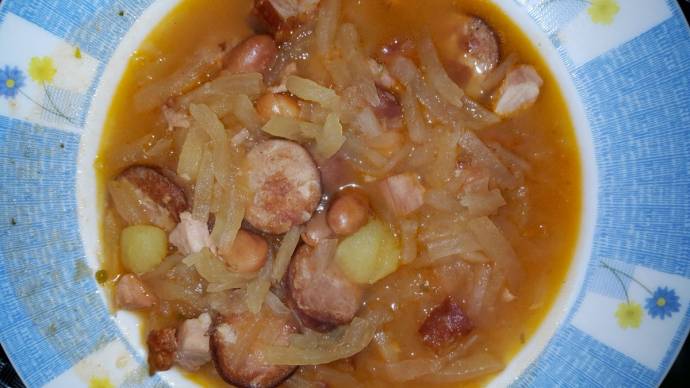January 19, 2017
Jota is a popular winter sour (fermented) turnip- or sauerkraut-based one-pot dish (enolončnica), which originates from Friuli and the Slovenian karst, and has settled most firmly in the Gorica (Gorizzia) region. If we are willing to believe Wikipedia, the name itself, jota, originates from Frulian jote, which in turn comes from Galician word for a soup - iutta.
The great appeal of one-pot meals is in their practicality. Jota is no exception here: we can make a huge amount of it in one go, leave some for the next day (usually these one-pot meals containing meat are even better if left to rest for a day or two), and freeze the rest for a day when we won’t have time to cook.
Similar to one of our previous recipes, finding a balance between animal fats and acidity is crucial in the case of jota. Which, again, is a matter of taste. This recipe gives you an option to cook the soup without sausage (and perhaps cook it as a side dish, or not at all) and/or wash the sour turnip before cooking to get rid of some of the acid, in case you would like your soup less sour.
I personally prefer turnip over sauerkraut due to its soft chunky texture and milder flavour, yet I know of people who might feel quite the opposite.
And since talking about the sourness, a word on cooking pots might come handy in case you have a choice. Pots, or rather the material they are made of, can be divided to reactive and non-reactive with the acidic and alkaline foods that are prepared in them. Ceramics and stainless steel are considered non-reactive, while aluminium, copper, iron and (non-stainless) steel are materials we might, if possible, want to avoid. For more on pots, click here.
Back to our recipe, we must admit it is on the heavier side of the spectrum. Jota can in fact be done without meat altogether. In this case, we suggest the sour turnip to be washed before cooking, although that’s far from mandatory, especially if you like your soup to be sour, as lactic acid, which we find in the fermented vegetables we are going to use, is also quite healthy.
For a big (about 8 litres) pot of soup, we will need:
1-2 onions
3-4 cloves of garlic
2 spoons of olive oil
salt (to taste)
3-4 potatoes (medium size, if bigger, then 2 might do)
½ kg of smoked pork ribs (or less if you prefer your food to be lighter)
800g can (a big one) of brown beans (rjavi fižol) or, 300g of dry brown beans if you will cook it yourself
2 kg sour turnip
1 teaspoon of Juniper berries
2-3 Bay leafs
1 teaspoon of parsley (optional)
1 teaspoon of paprika (optional)
200ml of potato paste (optional)
Kranjska klobasa (optional)
Even though we are cooking a single-pot meal, we’ll need at least two pots to make it: one for the turnip, one for the potatoes and three in case you opt for dry beans instead of canned ones.
In case you want to cook your own beans, it is advisable you let them soak overnight before cooking. Make sure you put them in deep enough water, which will need to be changed before beans are put on a stove. In addition to this, adding a few bay leaves to the beans while cooking might save you some digestive trouble, too.
As we want our potatoes to be purée-soft, we cannot cook them together with the turnip. Acid prevents any vegetable from softening while cooking, which is why even tomatoes are always added last if we are making, say, pasta sauce, let alone sour turnip or sauerkraut, which are even more acidic.
So we chop up our onions and garlic, stir them in the olive oil, then add the peeled potatoes cut in chunks, a little salt and cover with water. We boil the potatoes till soft then mash them a little (do not pour any water out), and then add to the turnip, which has been cooking separately.
Meanwhile, we take our big pot and stir fry cut pork ribs (make sure to cut all the bones out) and Kranjska klobasa, if we want to have it in the soup. Then we add sour turnip (we didn’t wash it) and cover it with water. We add bay leaves and juniper berries, wait till it all boils, then cook for about an hour. We then add the potatoes, as described above.
When the potatoes are in the pot, we add all the rest of the ingredients, including the beans. It is advised for the canned beans to be washed beforehand as the slimy liquid that forms around them might contain some undesired matter from the can itself.
We stir everything together and cook for another 10 minutes.
To compare and contrast two of the many ways of making this folk dish, we embedded below a video of another, quite different recipe of jota, in English. Dober tek!



